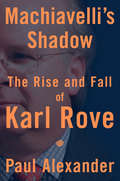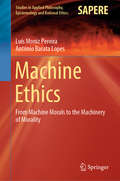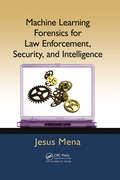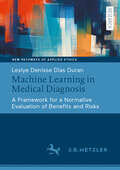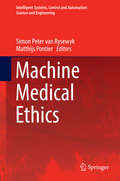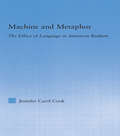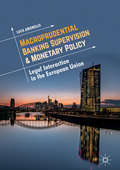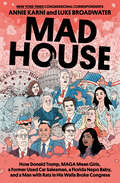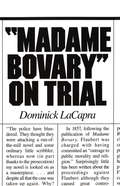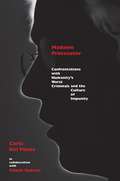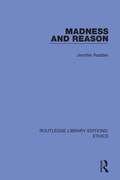- Table View
- List View
Machiavelli's Ethics
by Erica BennerMachiavelli's Ethics challenges the most entrenched understandings of Machiavelli, arguing that he was a moral and political philosopher who consistently favored the rule of law over that of men, that he had a coherent theory of justice, and that he did not defend the "Machiavellian" maxim that the ends justify the means. By carefully reconstructing the principled foundations of his political theory, Erica Benner gives the most complete account yet of Machiavelli's thought. She argues that his difficult and puzzling style of writing owes far more to ancient Greek sources than is usually recognized, as does his chief aim: to teach readers not how to produce deceptive political appearances and rhetoric, but how to see through them. Drawing on a close reading of Greek authors--including Thucydides, Xenophon, Plato, and Plutarch--Benner identifies a powerful and neglected key to understanding Machiavelli. This important new interpretation is based on the most comprehensive study of Machiavelli's writings to date, including a detailed examination of all of his major works: The Prince, The Discourses, The Art of War, and Florentine Histories. It helps explain why readers such as Bacon and Rousseau could see Machiavelli as a fellow moral philosopher, and how they could view The Prince as an ethical and republican text. By identifying a rigorous structure of principles behind Machiavelli's historical examples, the book should also open up fresh debates about his relationship to later philosophers, including Rousseau, Hobbes, and Kant.
Machiavelli's Shadow: The Rise and Fall of Karl Rove
by Paul AlexanderKarl Rove has come to personify scorched earth political tactics and merciless, win-at-any-cost trickery. His status as the so-called architect behind Bush's election victories has elevated him to a mythic kingmaker in the national imagination. Not since Mark Hanna, special assistant to President William McKinley, has someone not elected to public office played such a vital role in the governance of our nation. We know the myth, but who is the man? In Machiavelli's Shadow, the full, unvarnished truth about the mastermind of the Bush administration is revealed as swirling scandals and Karl Rove's diminished power have freed people to speak candidly as never before. Acclaimed author and veteran journalist Paul Alexander tracks Rove's journey from consummate outsider to presidential consigliere, conducting firsthand interviews with A-list sources who have never gone on the record about Rove before now. The result is a gripping, no-holds-barred account of the man whose insistence on politicizing any area on which he has advised the president—from the war in Iraq to domestic issues like Social Security, energy, the environment, and hotly controversial judicial matters—has brought about his own fall from grace and an escalating crisis within the government and the nation. Drawing on the author's extensive connections in the political arena and delving into all areas of Rove's life—political, business, psychological, and personal—this book stands as the definitive portrait of one of the most fascinating figures ever to emerge on the American political scene.
Machine Ethics: From Machine Morals to the Machinery of Morality (Studies in Applied Philosophy, Epistemology and Rational Ethics #53)
by Luís Moniz Pereira António Barata LopesThis book offers the first systematic guide to machine ethics, bridging between computer science, social sciences and philosophy. Based on a dialogue between an AI scientist and a novelist philosopher, the book discusses important findings on which moral values machines can be taught and how. In turn, it investigates what kind of artificial intelligence (AI) people do actually want. What are the main consequences of the integration of AI in people’s every-day life? In order to co-exist and collaborate with humans, machines need morality, but which moral values should we teach them? Moreover, how can we implement benevolent AI? These are just some of the questions carefully examined in the book, which offers a comprehensive account of ethical issues concerning AI, on the one hand, and a timely snapshot of the power and potential benefits of this technology on the other. Starting with an introduction to common-sense ethical principles, the book then guides the reader, helping them develop and understand more complex ethical concerns and placing them in a larger, technological context. The book makes these topics accessible to a non-expert audience, while also offering alternative reading pathways to inspire more specialized readers.
Machine Learning Forensics for Law Enforcement, Security, and Intelligence
by Jesus MenaIncreasingly, crimes and fraud are digital in nature, occurring at breakneck speed and encompassing large volumes of data. To combat this unlawful activity, knowledge about the use of machine learning technology and software is critical. Machine Learning Forensics for Law Enforcement, Security, and Intelligence integrates an assortment of deductive
Machine Learning for Cyber Security: Third International Conference, ML4CS 2020, Guangzhou, China, October 8–10, 2020, Proceedings, Part II (Lecture Notes in Computer Science #12487)
by Xiangliang Zhang Xiaofeng Chen Hongyang Yan Qiben YanThis three volume book set constitutes the proceedings of the Third International Conference on Machine Learning for Cyber Security, ML4CS 2020, held in Xi’an, China in October 2020.The 118 full papers and 40 short papers presented were carefully reviewed and selected from 360 submissions. The papers offer a wide range of the following subjects: Machine learning, security, privacy-preserving, cyber security, Adversarial machine Learning, Malware detection and analysis, Data mining, and Artificial Intelligence.
Machine Learning in Medical Diagnosis: A Framework for a Normative Evaluation of Benefits and Risks (Neue Wege der Angewandten Ethik / New Pathways of Applied Ethics)
by Leslye Denisse Dias DuranThis book seeks to navigate between the optimism that has arisen from the promise of the potential of machine learning (ML) in healthcare, and the lack of clarity about what realistic risks and benefits we can foresee. Its main aim is to develop a relational, rights-based normative approach to evaluating the distribution of burdens and benefits of implementing ML in medical diagnosis. This framework, called the "Ecosystem of Moral Constellations", assumes that every person has an equal claim to the fundamental rights necessary to lead one&’s life, but recognizes that there may be conflicting interests that risk violating or infringing the rights of an individual or individuals, and that therefore an assessment of these tensions requires a situational prioritization of certain rights over others. This framework proposes to consider the normative relevance of relationships at different points of moral engagement to assess the potential tensions between these burdens and benefits of these technologies. The author argues that decisions about the implementation of AI systems require more than an assessment of technical feasibility. Instead, it is imperative to consider the different normative goals and interests of the actors involved, the material capabilities of the tools, and the role they should play in the clinical workflow.
Machine Medical Ethics
by Simon Peter van Rysewyk Matthijs PontierThe essays in this book, written by researchers from both humanities and science, describe various theoretical and experimental approaches to adding medical ethics to a machine, what design features are necessary in order to achieve this, philosophical and practical questions concerning justice, rights, decision-making and responsibility in medical contexts, and accurately modeling essential physician-machine-patient relationships. In medical settings, machines are in close proximity with human beings: with patients who are in vulnerable states of health, who have disabilities of various kinds, with the very young or very old and with medical professionals. Machines in these contexts are undertaking important medical tasks that require emotional sensitivity, knowledge of medical codes, human dignity and privacy. As machine technology advances, ethical concerns become more urgent: should medical machines be programmed to follow a code of medical ethics? What theory or theories should constrain medical machine conduct? What design features are required? Should machines share responsibility with humans for the ethical consequences of medical actions? How ought clinical relationships involving machines to be modeled? Is a capacity for empathy and emotion detection necessary? What about consciousness? This collection is the first book that addresses these 21st-century concerns.
Machine and Metaphor: The Ethics of Language in American Realism (Literary Criticism and Cultural Theory)
by Jennifer C. CookAmerican literary realism burgeoned during a period of tremendous technological innovation. Because the realists evinced not only a fascination with this new technology but also an ethos that seems to align itself with science, many have paired the two fields rather unproblematically. But this book demonstrates that many realist writers, from Mark Twain to Stephen Crane, Charles W. Chesnutt to Edith Wharton, felt a great deal of anxiety about the advent of new technologies – precisely at the crucial intersection of ethics and language. For these writers, the communication revolution was a troubling phenomenon, not only because of the ways in which the new machines had changed and increased the circulation of language but, more pointedly, because of the ways in which language itself had effectively become a machine: a vehicle perpetuating some of society’s most pernicious clichés and stereotypes – particularly stereotypes of race – in unthinking iteration. This work takes a close look at how the realists tried to forge an ethical position between the two poles of science and sentimentality, attempting to create an alternative mode of speech that, avoiding the trap of codifying iteration, could enable ethical action.
Machine-Type Communication for Maritime Internet-of-Things: From Concept to Practice (Wireless Networks)
by Jingjing Zhang Michael Mao WangThis book introduces the concept of machine-type communication (MTC) for maritime Internet of Things. The first part of the book portrays a maritime MTC system from an architectural perspective and describes an MTC framework and the fundamental components, laying out a foundation that leads to an ultimate solution to the maritime IoT requirements and challenges. The second part ties together all discussed in the first part and demonstrates how to apply it to a practical system through a realistic design example based on an international maritime mobile spectrum. The book serves as a comprehensive tutorial of the maritime MTC from the top (the network architecture) to the bottom (the air/radio interface and regulatory radio spectrum constraints), guiding readers to an easier understanding of the maritime MTC-related issues and the rationale behind the design. The primary readers of this book include maritime communication engineers, maritime IoT professionals, maritime academia, and the general MTC and IoT communities.Presents the concept of machine-type communication (MTC) for maritime Internet of Things (IoT) and its services, requirements, and challenges;Explains space-earth-integrated maritime machine-type communication system architecture with a comparison with its land counterpart;Sets out a comprehensive framework and details the ways to implement it on a practical radio spectrum;Includes maritime MTC radio spectrum and regulations, network design, protocol design, and air interface design.
Macroprudential Banking Supervision & Monetary Policy: Legal Interaction In The European Union
by Luca AmorelloThe European experience suggests that the efforts made to achieve an efficient trade-off between monetary policy and prudential supervision ultimately failed. The severity of the global crisis have pushed central banks to explore innovative tools—within or beyond their statutory constraints—capable of restoring the smooth functioning of the financial cycle, including setting macroprudential policy instruments in the regulatory toolkit. But macroprudential and monetary policies, by sharing multiple transmission channels, may interact—and conflict—with each other. Such conflicts may represent not only an economic challenge in the pursuit of price and financial stability, but also a legal uncertainty characterizing the regulatory developments of the EU macroprudential and monetary frameworks. In analyzing the “legal interaction” between the two frameworks in the EU, this book seeks to provide evidence of the inconsistencies associated with the structural separation of macroprudential and monetary frameworks, shedding light upon the legal instruments that could reconcile any potential policy inconsistency.
Mad House: How Donald Trump, MAGA Mean Girls, a Former Used Car Salesman, a Florida Nepo Baby, and a Man with Rats in His Walls Broke Congress
by Annie Karni Luke BroadwaterAn exclusive fly-on-the-wall account of the epic dysfunction of the American Congress, from the rotating cast of failed Speakers to the MAGA efforts to impeach President Joe Biden to the insanity of the 2024 presidential race—by the star congressional reporters at The New York Times. <p> “Mad House contains cyanide and candy on every page, which proves to be a killer combo. I loved it.”—Mark Leibovich, author of the #1 New York Times bestsellers This Town and Thank You for Your Servitude. <p> The United States Congress has always been messy and far-from-august, but as Annie Karni and Luke Broadwater show here, in scorching, shocking detail, it has reached some kind of chaotic bottom. The anarchy that reigned over Congress’s lower chamber in the wake of the January 6th attack on the Capitol Building—the election of serial liar and con-man George Santos, revenge porn being shown on the floor of the house, and the theatrical high jinks of Lauren Boebert—all were a sign of decay and dysfunction of the highest order. <p> Even the members of the 118th Congress would admit it was a circus—but up close, the spectacle was more alarming than funny. Taking the reader into closed door meetings as House Republicans, in thrall to a cult of personality, bumble ever deeper into extremism, and sniping House Democrats lose faith in their President, the authors reveal a level of disorder that we have never seen before. <p> Mad House is a searing, rollicking, and deeply reported portrait of a body at war with itself, riven by pettiness, egomania, and score-settling, and defined by the truly unbelievable antics of people like Matt Gaetz, Marjorie Taylor Greene, and Jim Jordan, who, handed the reins of power, attempted to actually govern a country. They did the bare minimum but voters in the 2024 elections rewarded them nonetheless, giving MAGA Republicans control of the White House, the Senate, and the House—and delivering to President Donald Trump a malleable Congress of loyalists there to serve. If you want a peek at what the next four years might look like, there’s no better place to start than the dysfunction that led us here. <b>New York Times Bestseller</b>
Mad Mothers, Bad Mothers, and What a "Good" Mother Would Do: The Ethics of Ambivalence
by Sarah LaChance AdamsWhen a mother kills her child, we call her a bad mother, but, as this book shows, even mothers who intend to do their children harm are not easily categorized as "mad" or "bad." Maternal love is a complex emotion rich with contradictory impulses and desires, and motherhood is a conflicted state in which women constantly renegotiate the needs mother and child, the self and the other. Applying care ethics philosophy and the work of Emmanuel Levinas, Maurice Merleau-Ponty, and Simone de Beauvoir to real-world experiences of motherhood, Sarah LaChance Adams throws the inherent tensions of motherhood into sharp relief, drawing a more nuanced portrait of the mother and child relationship than previously conceived. The maternal example is particularly instructive for ethical theory, highlighting the dynamics of human interdependence while also affirming separate interests. LaChance Adams particularly focuses on maternal ambivalence and its morally productive role in reinforcing the divergence between oneself and others, helping to recognize the particularities of situation, and negotiating the difference between one's own needs and the desires of others. She ultimately argues maternal filicide is a social problem requiring a collective solution that ethical philosophy and philosophies of care can inform.
Mad River, Marjorie Rowland, and the Quest for LGBTQ Teachers’ Rights (New Directions in the History of Education)
by Margaret A. Nash Karen L. GravesMad River, Marjorie Rowland, and the Quest for LGBTQ Teachers’ Rights addresses an important legal case that set the stage for today’s LGBTQ civil rights–a case that almost no one has heard of. Marjorie Rowland v. Mad River School District involves an Ohio guidance counselor fired in 1974 for being bisexual. Rowland’s case made it to the U.S. Supreme Court, but the justices declined to consider it. In a spectacular published dissent, Justice Brennan laid out arguments for why the First and Fourteenth Amendments apply to bisexuals, gays, and lesbians. That dissent has been the foundation for LGBTQ civil rights advances since. In the first in-depth treatment of this foundational legal case, authors Margaret A. Nash and Karen L. Graves tell the story of that case and of Marjorie Rowland, the pioneer who fought for employment rights for LGBTQ educators and who paid a heavy price for that fight. It brings the story of LGBTQ educators’ rights to the present, including commentary on Bostock v Clayton County, the 2020 Supreme Court case that struck down employment discrimination against LGBT workers.
Mad in America: Bad Science, Bad Medicine, and the Enduring Mistreatment of the Mentally Ill
by Robert WhitakerAn updated edition of the classic history of schizophrenia in America, which gives voice to generations of patients who suffered through "cures" that only deepened their suffering and impaired their hope of recoverySchizophrenics in the United States currently fare worse than patients in the world's poorest countries. In Mad in America, medical journalist Robert Whitaker argues that modern treatments for the severely mentally ill are just old medicine in new bottles, and that we as a society are deeply deluded about their efficacy. The widespread use of lobotomies in the 1920s and 1930s gave way in the 1950s to electroshock and a wave of new drugs. In what is perhaps Whitaker's most damning revelation, Mad in America examines how drug companies in the 1980s and 1990s skewed their studies to prove that new antipsychotic drugs were more effective than the old, while keeping patients in the dark about dangerous side effects. A haunting, deeply compassionate book-updated with a new introduction and prologue bringing in the latest medical treatments and trends-Mad in America raises important questions about our obligations to the mad, the meaning of "insanity," and what we value most about the human mind.
Mad-Doctors in the Dock: Defending the Diagnosis 1760–1913
by Joel Peter Eigen“Detailed courtroom narratives . . . give us a colorful and gripping sense of the life-and-death maneuvers involved in mounting an insanity defense.” —Andrew Scull, author of Madness in CivilizationShortly before she pushed her infant daughter headfirst into a bucket of water and fastened the lid, Annie Cherry warmed the pail because, as she later explained to a police officer, “It would have been cruel to put her in cold water.” Afterwards, this mother sat down and poured herself a cup of tea. At Cherry’s trial at the Old Bailey in 1877, Henry Charlton Bastian, physician to the National Hospital for the Paralyzed and Epileptic, focused his testimony on her preternatural calm following the drowning. Like many other late Victorian medical men, Bastian believed that the mother’s act and her subsequent behavior indicated homicidal mania, a novel species of madness that challenged the law’s criterion for assigning criminal culpability.How did Dr. Bastian and his cohort of London’s physicians, surgeons, and apothecaries—originally known as “mad-doctors”—arrive at such an innovative diagnosis, and how did they defend it in court? Mad-Doctors in the Dock is a sophisticated exploration of the history of the insanity defense in the English courtroom from the middle of the eighteenth century to the early twentieth century. Joel Peter Eigen examines courtroom testimony offered in nearly 1,000insanity trials, transporting us into the world of psychiatric diagnosis and criminal justice. The first comprehensive account of how medical insight and folk psychology met in the courtroom, this book makes clear the tragedy of the crimes, the spectacle of the trials, and the consequences of the diagnosis for the emerging field of forensic psychiatry.
Mad-Doctors in the Dock: Defending the Diagnosis, 1760–1913
by Joel Peter EigenA captivating history of the defense of the insanity plea in England.Shortly before she pushed her infant daughter headfirst into a bucket of water and fastened the lid, Annie Cherry warmed the pail because, as she later explained to a police officer, "It would have been cruel to put her in cold water." Afterwards, this mother sat down and poured herself a cup of tea. At Cherry’s trial at the Old Bailey in 1877, Henry Charlton Bastian, physician to the National Hospital for the Paralyzed and Epileptic, focused his testimony on her preternatural calm following the drowning. Like many other late Victorian medical men, Bastian believed that the mother’s act and her subsequent behavior indicated homicidal mania, a novel species of madness that challenged the law’s criterion for assigning criminal culpability.How did Dr. Bastian and his cohort of London’s physicians, surgeons, and apothecaries—originally known as "mad-doctors"—arrive at such an innovative diagnosis, and how did they defend it in court? Mad-Doctors in the Dock is a sophisticated exploration of the history of the insanity defense in the English courtroom from the middle of the eighteenth century to the early twentieth century. Joel Peter Eigen examines courtroom testimony offered in nearly 1,000 insanity trials, transporting us into the world of psychiatric diagnosis and criminal justice. The first comprehensive account of how medical insight and folk psychology met in the courtroom, this book makes clear the tragedy of the crimes, the spectacle of the trials, and the consequences of the diagnosis for the emerging field of forensic psychiatry.
Madam Chief Justice: Jean Hoefer Toal of South Carolina
by W. Lewis Burke Jr. Joan P. AsseyIn Madam Chief Justice, editors W. Lewis Burke Jr. and Joan P. Assey chronicle the remarkable career of Jean Hoefer Toal, South Carolina's first female Supreme Court Chief Justice. As a lawyer, legislator, and judge, Toal is one of the most accomplished women in South Carolina history. In this volume, contributors, including two United States Supreme Court Justices, federal and state judges state leaders, historians, legal scholars, leading attorneys, family, and friends, provide analysis, perspective, and biographical information about the life and career of this dynamic leader and her role in shaping South Carolina. Growing up in Columbia during the 1950s and 60s, Jean Hoefer was a youthful witness to the civil rights movement in the state and nation. Observing the state's premier civil rights lawyer Matthew J. Perry Jr. in court encouraged her to attend law school, where she met her husband, Bill Toal. When she was admitted to the South Carolina Bar in 1968, fewer than one hundred women had been admitted in the state's history. From then forward she was both a leader and a role model. As a lawyer she excelled in trial and appellate work and won major victories on behalf of Native Americans and women. In 1975, Toal was elected to the South Carolina House of Representatives and despite her age and gender quickly became one of the most respected members of that body. During her fourteen years as a House member, Toal promoted major legislation on many issues including constitutional law, criminal law, utilities regulation, local government, state appropriations, workers compensation, and freedom of information. In 1988, Toal was sworn in as the first female justice on the Supreme Court of South Carolina, where she made her mark through her preparation and insight. She was elected Chief Justice in 2000, becoming the first woman ever to hold the highest position in the state's judiciary. As Chief Justice, Toal not only modernized her court, but also the state's judicial system. As Toal's two daughters write in their chapter, the traits their mother brings to her professional life—exuberance, determination, and loyalty—are the same traits she demonstrates in her personal and family life. As a child, Toal loved roller skating in the lobby of the post office,a historic building that now serves as the Supreme Court of South Carolina. From a child in Columbia to Madam Chief Justice, her story comes full circle in this compelling account of her life and influence. Madam Chief Justice features a foreword by Sandra Day O'Connor, retired associate justice of the United State Supreme Court, and an introduction by Ruth Bader Ginsburg, an associate justice of the United States Supreme Court.Contributors:Joseph F. Anderson, Jr.Joan P. AsseyJay BenderC. Mitchell BrownW. Lewis Burke Jr.M. Elizabeth (Liz) CrumTina CundariCameron McGowan CurrieWalter B. EdgarJean Toal EisenRobert L. FelixRichard Mark GergelRuth Bader GinsburgElizabeth Van Doren GraySue Erwin HarperJessica Childers HarringtonKaye G. HearnBlake HewittI. S. Leevy JohnsonJohn W. KittredgeLilla Toal MandsagerMary Campbell McQueenJames E. MooreSandra Day O'ConnorRichard W. RileyBakari T. SellersRobert J. SheheenAmelia Waring WalkerBradish J. Waring
Madame Bovary on Trial
by Dominick LaCapraIn 1857, following the publication of Madame Bovary, Flaubert was charged with having committed an "outrage to public morality and religion." Dominick LaCapra, an intellectual historian with wide-ranging literary interests, here examines this remarkable trial. LaCapra draws on material from Flaubert’s correspondence, the work of literary critics, and Jean-Paul Sartre’s analysis of Flaubert. LaCapra maintains that Madame Bovary is at the intersection of the traditional and the modern novel, simultaneously invoking conventional expectations and subverting them.
Madame Prosecutor: Confrontations with Humanity's Worst Criminals and the Culture of Impunity
by Chuck Sudetic Carla Del PonteDel Ponte won international recognition as Switzerland's attorney general when she pursued cases against the Sicilian Mafia. In 1999, she become the chief prosecutor of the International Criminal Tribunal. She offers this courageous and startling memoir of her eight years spent striving to serve justice.
Madame Prosecutor: Confrontations with Humanity's Worst Criminals and the Culture of Impunity
by Chuck Sudetic Carla Del PonteCarla Del Ponte won international recognition as Switzerland's attorney general when she pursued cases against the Sicilian mafia. In 1999, she answered the United Nations' call to become the chief prosecutor of the International Criminal Tribunal for the former Yugoslavia and for Rwanda. In her new role, Del Ponte confronted genocide and crimes against humanity head-on, struggling to bring to justice the highest-ranking individuals responsible for massive acts of violence in Rwanda, Bosnia and Herzegovina, Croatia, and Kosovo.These tribunals have been unprecedented. They operate along the edge of the divide between national sovereignty and international responsibility, in the gray zone between the judicial and the political, a largely unexplored realm for prosecutors and judges. It is a realm whose native inhabitants-political leaders and diplomats, soldiers and spies-assume that they can commit the big crime without being held culpable. It is a realm crisscrossed by what Del Ponte calls the muro di gomma -"the wall of rubber"- a metaphor referring to the tactics government officials use to hide their unwillingness to confront the culture of impunity that has allowed persons responsible for acts of unspeakable, wholesale violence to escape accountability. Madame Prosecutor is Del Ponte's courageous and startling memoir of her eight years spent striving to serve justice.
Made Only in India: Goods with Geographical Indications
by Anu KapurWhat makes Darjeeling tea, Pashmina shawl, Monsooned Malabar Arabica coffee and Chanderi saree special? Why is it that some goods derive their uniqueness through their inherent linkage to a place? In a pioneering study, this book explores this intriguing question in the Indian context across 199 registered goods with geographical indications, linked with their place of origin. It argues that the origin of these goods is attributed to a distinctive ecology that brews in a particular place. The attributes of their origin further endorse their unique geographical indications through legal channels. Drawing from a variety of disciplines including geography, history, sociology, handicrafts, paintings, and textiles, the author also examines the Geographical Indications Act of 1999, and shows how it has created a scope to identify, register and protect those goods, be they natural, agricultural, or manufactured. The work presents a new perspective on the indigenous diversities and offers an original understanding of the geography and history of India. Lucid and accessible, with several illustrative maps, this book will be useful to scholars and researchers in the social sciences, environmental studies, development studies, law, trade and history.
Made by Humans: The AI Condition
by Ellen BroadWho is designing AI? A select, narrow group. How is their world view shaping our future? Artificial intelligence can be all too human: quick to judge, capable of error, vulnerable to bias. It's made by humans, after all. Humans make decisions about the laws and standards, the tools, the ethics in this new world. Who benefits. Who gets hurt. Made by Humans explores our role and responsibilities in automation. Roaming from Australia to the UK and the US, elite data expert Ellen Broad talks to world leaders in AI about what we need to do next. It is a personal, thought-provoking examination of humans as data and humans as the designers of systems that are meant to help us.
Madhouse: A Tragic Tale of Megalomania and Modern Medicine
by Andrew ScullMadhouse reveals a long-suppressed medical scandal, shocking in its brutality and sobering in its implications. It shows how a leading American psychiatrist of the early twentieth century came to believe that mental illnesses were the product of chronic infections that poisoned the brain. Convinced that he had uncovered the single source of psychosis, Henry Cotton, superintendent of the Trenton State Hospital, New Jersey, launched a ruthless campaign to "eliminate the perils of pus infection." Teeth were pulled, tonsils excised, and stomachs, spleens, colons, and uteruses were all sacrificed in the assault on "focal sepsis." Many patients did not survive Cotton's surgeries; thousands more were left mangled and maimed. Cotton's work was controversial, yet none of his colleagues questioned his experimental practices. Subsequent historians and psychiatrists too have ignored the events that cast doubt on their favorite narratives of scientific and humanitarian progress. In a remarkable feat of historical detective work, Andrew Scull exposes the full, frightening story of madness among the mad-doctors. Drawing on a wealth of documents and interviews, he reconstructs in vivid detail a nightmarish, cautionary chapter in modern psychiatry when professionals failed to police themselves.
Madison's Music: On Reading the First Amendment
by Burt Neuborne&“A detailed history of the transformation of First Amendment law&” from one of the nation&’s foremost civil liberties lawyers (The New York Times). Are you sitting down? It turns out that everything you learned about the First Amendment is wrong. For too long, we&’ve been treating small, isolated snippets of the text as infallible gospel without looking at the masterpiece of the whole. Legal luminary Burt Neuborne argues that the structure of the First Amendment as well as of the entire Bill of Rights was more intentional than most people realize, beginning with the internal freedom of conscience and working outward to freedom of expression and finally freedom of public association. This design, Neuborne argues, was not to protect discrete individual rights—such as the rights of corporations to spend unlimited amounts of money to influence elections—but to guarantee that the process of democracy continues without disenfranchisement, oppression, or injustice. Neuborne, who was the legal director of the ACLU and has argued numerous cases before the Supreme Court, invites us to hear the &“music&” within the form and content of Madison&’s carefully formulated text. When we hear Madison&’s music, a democratic ideal flowers in front of us, and we can see that the First Amendment gives us the tools to fight for campaign finance reform, the right to vote, equal rights in the military, the right to be full citizens, and the right to prevent corporations from riding roughshod over the weakest among us. Neuborne gives us an eloquent lesson in democracy that informs and inspires. &“In the dark art of lawyering, Neuborne has always been considered a white knight.&” —New York
Madness and Reason
by Jennifer RaddenOriginally published in 1985, this book provides a philosophical analysis of the concepts of madness and moral responsibility. It challenges the view that because they are victims of mental illness, the insane should not be blamed for actions resulting from their condition. The author urges a return to the neglected equation between madness and a want of reason, arguing that the impulse to excuse the criminally insane must be grounded in an appeal to their irrationality and unreasonableness. Through meticulous examination of the psychological states and behaviour patterns of major mental abnormalities, such as schizophrenia and depression, the author develops a notion of exculpating unreason. This is an interdisciplinary book which encompasses analytical philosophy, abnormal psychology and law.

